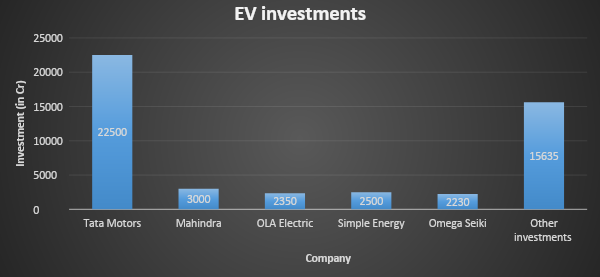Electric vehicles (EVs) are a crucial cog in India’s quest to achieve net-zero emissions by 2070. But recently they have been attracting national attention for all the wrong reasons

A spate of EV explosions in India has raised concerns about the safety of the technology. However, it is too soon to write off EVs based on these incidents alone. Only thorough investigations and analyses will reveal whether the battery explosions in Hyderabad and elsewhere in the country were caused by severe weather, improper battery management, or other factors.
These incidents have prompted widespread criticism that automakers are rushing the production of electric vehicles (EVs) to capture a large portion of the expanding market, thereby compromising human safety. However, if one examines the investments made by leading EV manufacturers in India (see figure below), it is evident that these investments were made with the bright future of EVs in India in mind. Given the substantial capital expenditures, it is unlikely that these companies will generate profits in the near future.

Moreover, human loss and accidents erode consumers' faith in businesses, thereby affecting their long-term credibility. According to the Ministry of Road Transport and Highways (MoRTH), the proportion of electric vehicle (EV) explosions on Indian roads is negligible (not even 0.1 percent). In light of the overall advantages of EVs in the transition to electromobility, these incidents should be viewed as exceptions rather than the norm.
A battery for an electric vehicle is a complex device, and research is ongoing to improve battery safety parameters, particularly in tropical countries like India. The NITI Aayog suggests that when designing batteries for tropical regions, battery manufacturers should take into account the high average ambient temperatures, relative humidity, and radiation levels. Currently, automotive manufacturers primarily use lithium-ion batteries for electric vehicles. As they improve and become safer, solid-state and lithium-sulfur batteries may dominate the market in the future. Global electric vehicle (EV) manufacturers such as Tesla, Tata, and Ford have devoted research teams working to improve battery performance. It is only a matter of time before additional advances are made in electric vehicle battery technology, performance, and safety.
In the past, mobile battery explosions have occurred, and critics were outraged even then. However, the outcome is visible to everyone. EV manufacturing companies must investigate and correct the flaws that have led to the current crisis, whether it is poor thermal management, the use of B-grade cells, or mismatched internal resistance in battery packs. Features such as automatic power cut-off during battery charging would go a long way toward preventing problems caused by overcharging. EV manufacturers should also educate consumers on the proper use of vehicles. Consumers should be made aware, for instance, that parking EVs in extremely hot weather (especially while charging and in a highly charged state) could cause batteries to explode due to thermal runaway.
The advantages of EVs significantly outweigh their disadvantages. Long-term, the EV industry will be one of the largest job markets in India and may offer a workable solution to global warming. Each year, the number of private, commercial, and public vehicles in India increases at an alarming rate. EVs are the primary alternative to fossil fuel-based vehicles in the United States.
Indigenous battery technologies suited to Indian conditions could be adopted and implemented — with the assistance of academic and industrial collaborations — to accelerate the development of safer and more effective batteries in the country. Consider establishing R&D wings for the development of new technologies and the modification of imported technologies to make them suitable for Indian conditions. Changes may be made to the design, battery management system, and cooling system. In the long run, India will not benefit from simply assembling battery packs using imported technology.
Even though a few centres of excellence at leading IITs are dedicated to battery and EV research, there is an urgent need to establish a dedicated research institute for EVs (including batteries) to address future challenges. The government could consider mandating battery testing using existing facilities at the Central Power Research Institute in Bengaluru, or by establishing a separate testing facility dedicated to EV batteries. Testing organizations could certify batteries prior to their installation in electric vehicles. The government may also consider establishing a separate EV division within the National Rail and Transport Institute (NRTI) to focus on battery research and certification.
While there is no denying that these mishaps are a cause for concern these are still early days. Instead of becoming vocal critics, we must give the EV manufacturing industry and the government ample time to scientifically resolve teething issues.
 EVStory.in - India's best EV Portal
EVStory.in - India's best EV Portal